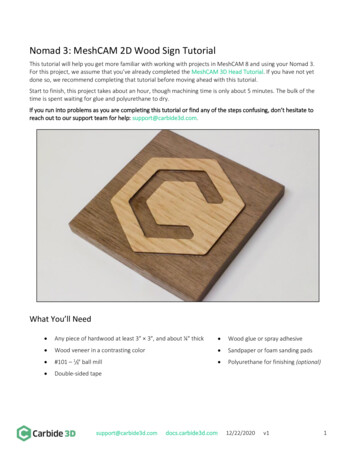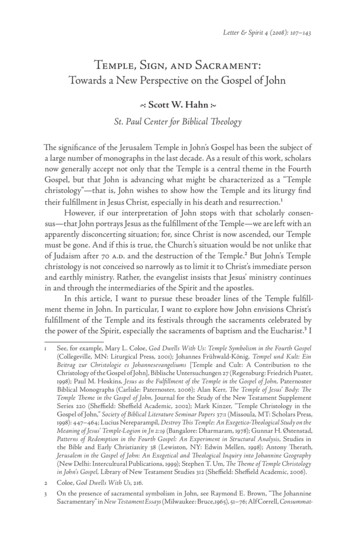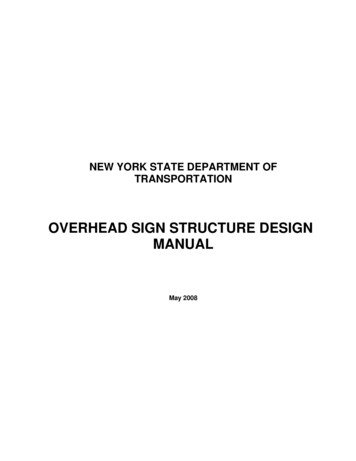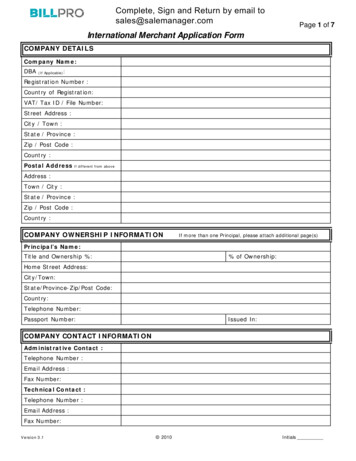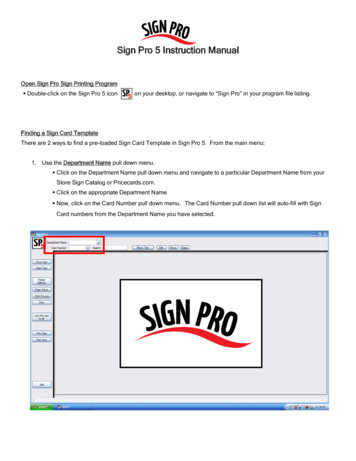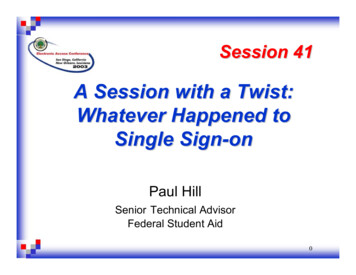
Transcription
The Sign of the FourSir Arthur Conan DoyleIllustrated by Richard Gutschmidt
The preparer of this public-domain (U.S.) textis unknown. However, the Project Gutenbergedition (“sign410”) was converted to LATEX using GutenMark software and re-edited byRon Burkey (formatting only) using lyx software. Report problems to info@sandroid.org.B 12/13/02 Proofing completed.C 12/30/02 Added illustrations from the1902 Lutz Verlag (German) edition, asarchived at bakestreet221b.de.D 01/30/08 “—-” was everywhere replacedwith “—”.
ContentsChapter I. The Science of Deduction1Chapter II. The Statement of the Case15Chapter III. In Quest of a Solution25Chapter IV. The Story of the Bald-HeadedMan35Chapter V. The Tragedy of PondicherryLodge51Chapter VI. Sherlock Holmes Gives aDemonstration65Chapter VII. The Episode of the Barrel79Chapter VIII. The Baker Street Irregulars99Chapter IX. A Break in the Chain115Chapter X. The End of the Islander133Chapter XI. The Great Agra Treasure149Chapter XII. The Strange Story ofJonathan Small161i
ii
Chapter I. TheScience ofDeductionSherlock Holmes took his bottle from the corner of the mantel-piece and his hypodermicsyringe from its neat morocco case. With hislong, white, nervous fingers he adjusted thedelicate needle, and rolled back his left shirtcuff. For some little time his eyes restedthoughtfully upon the sinewy forearm andwrist all dotted and scarred with innumerablepuncture-marks. Finally he thrust the sharppoint home, pressed down the tiny piston, andsank back into the velvet-lined arm-chair witha long sigh of satisfaction.Three times a day for many months I hadwitnessed this performance, but custom hadnot reconciled my mind to it. On the contrary,from day to day I had become more irritable atthe sight, and my conscience swelled nightlywithin me at the thought that I had lackedthe courage to protest. Again and again I hadregistered a vow that I should deliver my soulupon the subject, but there was that in the1
2The Sign of the FourH ISEYES RESTED THOUGHTFULLY UPONTHE SINEWY FOREARM AND WRIST.
The Science of Deduction3cool, nonchalant air of my companion whichmade him the last man with whom one wouldcare to take anything approaching to a liberty.His great powers, his masterly manner, andthe experience which I had had of his manyextraordinary qualities, all made me diffidentand backward in crossing him.Yet upon that afternoon, whether it wasthe Beaune which I had taken with my lunch,or the additional exasperation produced bythe extreme deliberation of his manner, I suddenly felt that I could hold out no longer.“Which is it to-day?” I asked,—“morphineor cocaine?”He raised his eyes languidly from the oldblack-letter volume which he had opened. “Itis cocaine,” he said,—“a seven-per-cent. solution. Would you care to try it?”“No, indeed,” I answered, brusquely. “Myconstitution has not got over the Afghan campaign yet. I cannot afford to throw any extrastrain upon it.”He smiled at my vehemence. “Perhaps youare right, Watson,” he said. “I suppose thatits influence is physically a bad one. I find it,however, so transcendently stimulating andclarifying to the mind that its secondary action is a matter of small moment.”“But consider!” I said, earnestly. “Countthe cost! Your brain may, as you say, be rousedand excited, but it is a pathological and morbid process, which involves increased tissuechange and may at last leave a permanentweakness. You know, too, what a black reaction comes upon you. Surely the game is
4The Sign of the Fourhardly worth the candle. Why should you, fora mere passing pleasure, risk the loss of thosegreat powers with which you have been endowed? Remember that I speak not only asone comrade to another, but as a medical manto one for whose constitution he is to some extent answerable.”He did not seem offended. On the contrary,he put his finger-tips together and leaned hiselbows on the arms of his chair, like one whohas a relish for conversation.“My mind,” he said, “rebels at stagnation.Give me problems, give me work, give me themost abstruse cryptogram or the most intricate analysis, and I am in my own proper atmosphere. I can dispense then with artificial stimulants. But I abhor the dull routineof existence. I crave for mental exaltation.That is why I have chosen my own particularprofession,—or rather created it, for I am theonly one in the world.”“The only unofficial detective?” I said, raising my eyebrows.“The only unofficial consulting detective,”he answered. “I am the last and highestcourt of appeal in detection. When Gregsonor Lestrade or Athelney Jones are out of theirdepths—which, by the way, is their normalstate—the matter is laid before me. I examine the data, as an expert, and pronounce aspecialist’s opinion. I claim no credit in suchcases. My name figures in no newspaper. Thework itself, the pleasure of finding a field formy peculiar powers, is my highest reward.But you have yourself had some experience
The Science of Deduction5of my methods of work in the Jefferson Hopecase.”“Yes, indeed,” said I, cordially. “I was neverso struck by anything in my life. I even embodied it in a small brochure with the somewhat fantastic title of ‘A Study in Scarlet.”’He shook his head sadly. “I glanced overit,” said he. “Honestly, I cannot congratulate you upon it. Detection is, or ought tobe, an exact science, and should be treated inthe same cold and unemotional manner. Youhave attempted to tinge it with romanticism,which produces much the same effect as if youworked a love-story or an elopement into thefifth proposition of Euclid.”“But the romance was there,” I remonstrated. “I could not tamper with the facts.”“Some facts should be suppressed, or atleast a just sense of proportion should be observed in treating them. The only point in thecase which deserved mention was the curiousanalytical reasoning from effects to causes bywhich I succeeded in unraveling it.”I was annoyed at this criticism of a workwhich had been specially designed to pleasehim. I confess, too, that I was irritated bythe egotism which seemed to demand that every line of my pamphlet should be devotedto his own special doings. More than onceduring the years that I had lived with himin Baker Street I had observed that a smallvanity underlay my companion’s quiet and didactic manner. I made no remark, however,but sat nursing my wounded leg. I had aJezail bullet through it some time before, and,
6The Sign of the Fourthough it did not prevent me from walking, itached wearily at every change of the weather.“My practice has extended recently to theContinent,” said Holmes, after a while, fillingup his old brier-root pipe. “I was consultedlast week by Francois Le Villard, who, as youprobably know, has come rather to the frontlately in the French detective service. He hasall the Celtic power of quick intuition, but heis deficient in the wide range of exact knowledge which is essential to the higher developments of his art. The case was concerned witha will, and possessed some features of interest. I was able to refer him to two parallelcases, the one at Riga in 1857, and the otherat St. Louis in 1871, which have suggested tohim the true solution. Here is the letter whichI had this morning acknowledging my assistance.” He tossed over, as he spoke, a crumpled sheet of foreign notepaper. I glanced myeyes down it, catching a profusion of notes ofadmiration, with stray “magnifiques,” “coupde-maitres,” and “tours-de-force,” all testifyingto the ardent admiration of the Frenchman.“He speaks as a pupil to his master,” saidI.“Oh, he rates my assistance too highly,”said Sherlock Holmes, lightly. “He has considerable gifts himself. He possesses two outof the three qualities necessary for the idealdetective. He has the power of observationand that of deduction. He is only wanting inknowledge; and that may come in time. He isnow translating my small works into French.”“Your works?”
The Science of Deduction7“Oh, didn’t you know?” he cried, laughing. “Yes, I have been guilty of several monographs. They are all upon technical subjects.Here, for example, is one ‘Upon the Distinction between the Ashes of the Various Tobaccoes.’ In it I enumerate a hundred and fortyforms of cigar-, cigarette-, and pipe-tobacco,with colored plates illustrating the differencein the ash. It is a point which is continuallyturning up in criminal trials, and which issometimes of supreme importance as a clue.If you can say definitely, for example, thatsome murder has been done by a man whowas smoking an Indian lunkah, it obviouslynarrows your field of search. To the trainedeye there is as much difference between theblack ash of a Trichinopoly and the white fluffof bird’s-eye as there is between a cabbage anda potato.”“You have an extraordinary genius forminutiae,” I remarked.“I appreciate their importance. Here ismy monograph upon the tracing of footsteps,with some remarks upon the uses of plaster ofParis as a preserver of impresses. Here, too,is a curious little work upon the influence of atrade upon the form of the hand, with lithotypes of the hands of slaters, sailors, corkcutters, compositors, weavers, and diamondpolishers. That is a matter of great practicalinterest to the scientific detective,—especiallyin cases of unclaimed bodies, or in discoveringthe antecedents of criminals. But I weary youwith my hobby.”“Not at all,” I answered, earnestly. “It is
8The Sign of the Fourof the greatest interest to me, especially sinceI have had the opportunity of observing yourpractical application of it. But you spoke justnow of observation and deduction. Surely theone to some extent implies the other.”“Why, hardly,” he answered, leaning backluxuriously in his arm-chair, and sending upthick blue wreaths from his pipe. “For example, observation shows me that you have beento the Wigmore Street Post-Office this morning, but deduction lets me know that whenthere you dispatched a telegram.”“Right!” said I. “Right on both points! ButI confess that I don’t see how you arrived at it.It was a sudden impulse upon my part, and Ihave mentioned it to no one.”“It is simplicity itself,” he remarked,chuckling at my surprise,—“so absurdly simple that an explanation is superfluous; andyet it may serve to define the limits of observation and of deduction. Observation tells methat you have a little reddish mould adhering to your instep. Just opposite the SeymourStreet Office they have taken up the pavement and thrown up some earth which lies insuch a way that it is difficult to avoid treadingin it in entering. The earth is of this peculiarreddish tint which is found, as far as I know,nowhere else in the neighborhood. So much isobservation. The rest is deduction.”“How, then, did you deduce the telegram?”“Why, of course I knew that you had notwritten a letter, since I sat opposite to you allmorning. I see also in your open desk therethat you have a sheet of stamps and a thick
The Science of Deduction9bundle of post-cards. What could you go intothe post-office for, then, but to send a wire?Eliminate all other factors, and the one whichremains must be the truth.”“In this case it certainly is so,” I replied,after a little thought. “The thing, however, is,as you say, of the simplest. Would you thinkme impertinent if I were to put your theoriesto a more severe test?”“On the contrary,” he answered, “it wouldprevent me from taking a second dose of cocaine. I should be delighted to look into anyproblem which you might submit to me.”“I have heard you say that it is difficult fora man to have any object in daily use without leaving the impress of his individualityupon it in such a way that a trained observermight read it. Now, I have here a watch whichhas recently come into my possession. Wouldyou have the kindness to let me have an opinion upon the character or habits of the lateowner?”I handed him over the watch with someslight feeling of amusement in my heart, forthe test was, as I thought, an impossible one,and I intended it as a lesson against the somewhat dogmatic tone which he occasionally assumed. He balanced the watch in his hand,gazed hard at the dial, opened the back, andexamined the works, first with his naked eyesand then with a powerful convex lens. I couldhardly keep from smiling at his crestfallenface when he finally snapped the case to andhanded it back.“There are hardly any data,” he remarked.
10HEThe Sign of the FourBALANCED THE WATCH IN HIS HAND.
The Science of Deduction11“The watch has been recently cleaned, whichrobs me of my most suggestive facts.”“You are right,” I answered.“It wascleaned before being sent to me.” In my heartI accused my companion of putting forward amost lame and impotent excuse to cover hisfailure. What data could he expect from anuncleaned watch?“Though unsatisfactory, my research hasnot been entirely barren,” he observed, staring up at the ceiling with dreamy, lack-lustreeyes. “Subject to your correction, I shouldjudge that the watch belonged to your elderbrother, who inherited it from your father.”“That you gather, no doubt, from the H. W.upon the back?”“Quite so. The W. suggests your own name.The date of the watch is nearly fifty yearsback, and the initials are as old as the watch:so it was made for the last generation. Jewelry usually descents to the eldest son, and heis most likely to have the same name as thefather. Your father has, if I remember right,been dead many years. It has, therefore, beenin the hands of your eldest brother.”“Right, so far,” said I. “Anything else?”“He was a man of untidy habits,—veryuntidy and careless. He was left with goodprospects, but he threw away his chances,lived for some time in poverty with occasionalshort intervals of prosperity, and finally, taking to drink, he died. That is all I can gather.”I sprang from my chair and limped impatiently about the room with considerable bitterness in my heart.
12The Sign of the Four“This is unworthy of you, Holmes,” I said.“I could not have believed that you would havedescended to this. You have made inquiresinto the history of my unhappy brother, andyou now pretend to deduce this knowledge insome fanciful way. You cannot expect me tobelieve that you have read all this from hisold watch! It is unkind, and, to speak plainly,has a touch of charlatanism in it.”“My dear doctor,” said he, kindly, “pray accept my apologies. Viewing the matter as anabstract problem, I had forgotten how personal and painful a thing it might be to you. Iassure you, however, that I never even knowthat you had a brother until you handed methe watch.”“Then how in the name of all that is wonderful did you get these facts? They are absolutely correct in every particular.”“Ah, that is good luck. I could only saywhat was the balance of probability. I did notat all expect to be so accurate.”“But it was not mere guess-work?”“No, no: I never guess. It is a shocking habit,—destructive to the logical faculty.What seems strange to you is only so becauseyou do not follow my train of thought or observe the small facts upon which large inferences may depend. For example, I began bystating that your brother was careless. Whenyou observe the lower part of that watch-caseyou notice that it is not only dinted in twoplaces, but it is cut and marked all over fromthe habit of keeping other hard objects, suchas coins or keys, in the same pocket. Surely
The Science of Deduction13it is no great feat to assume that a man whotreats a fifty-guinea watch so cavalierly mustbe a careless man. Neither is it a very farfetched inference that a man who inherits onearticle of such value is pretty well provided forin other respects.”I nodded, to show that I followed his reasoning.“It is very customary for pawnbrokers inEngland, when they take a watch, to scratchthe number of the ticket with a pin-point uponthe inside of the case. It is more handy thana label, as there is no risk of the numberbeing lost or transposed. There are no lessthan four such numbers visible to my lens onthe inside of this case. Inference,—that yourbrother was often at low water. Secondaryinference,—that he had occasional bursts ofprosperity, or he could not have redeemedthe pledge. Finally, I ask you to look atthe inner plate, which contains the key-hole.Look at the thousands of scratches all roundthe hole,—marks where the key has slipped.What sober man’s key could have scored thosegrooves? But you will never see a drunkard’swatch without them. He winds it at night, andhe leaves these traces of his unsteady hand.Where is the mystery in all this?”“It is as clear as daylight,” I answered. “Iregret the injustice which I did you. I shouldhave had more faith in your marvellous faculty. May I ask whether you have any professional inquiry on foot at present?”“None. Hence the cocaine. I cannot livewithout brain-work. What else is there to live
14The Sign of the Fourfor? Stand at the window here. Was eversuch a dreary, dismal, unprofitable world? Seehow the yellow fog swirls down the street anddrifts across the dun-colored houses. Whatcould be more hopelessly prosaic and material? What is the use of having powers, doctor, when one has no field upon which to exert them? Crime is commonplace, existenceis commonplace, and no qualities save thosewhich are commonplace have any functionupon earth.”I had opened my mouth to reply to thistirade, when with a crisp knock our landladyentered, bearing a card upon the brass salver.“A young lady for you, sir,” she said, addressing my companion.“Miss Mary Morstan,” he read. “Hum! Ihave no recollection of the name. Ask theyoung lady to step up, Mrs. Hudson. Don’t go,doctor. I should prefer that you remain.”
Chapter II. TheStatement of theCaseMiss Morstan entered the room with a firmstep and an outward composure of manner.She was a blonde young lady, small, dainty,well gloved, and dressed in the most perfecttaste. There was, however, a plainness andsimplicity about her costume which bore withit a suggestion of limited means. The dresswas a sombre grayish beige, untrimmed andunbraided, and she wore a small turban of thesame dull hue, relieved only by a suspicion ofwhite feather in the side. Her face had neitherregularity of feature nor beauty of complexion, but her expression was sweet and amiable, and her large blue eyes were singularlyspiritual and sympathetic. In an experience ofwomen which extends over many nations andthree separate continents, I have never lookedupon a face which gave a clearer promise of arefined and sensitive nature. I could not butobserve that as she took the seat which Sherlock Holmes placed for her, her lip trembled,15
16The Sign of the Fourher hand quivered, and she showed every signof intense inward agitation.“I have come to you, Mr. Holmes,” she said,“because you once enabled my employer, Mrs.Cecil Forrester, to unravel a little domesticcomplication. She was much impressed byyour kindness and skill.”“Mrs. Cecil Forrester,” he repeatedthoughtfully. “I believe that I was of someslight service to her. The case, however, as Iremember it, was a very simple one.”“She did not think so. But at least you cannot say the same of mine. I can hardly imagine anything more strange, more utterly inexplicable, than the situation in which I findmyself.”Holmes rubbed his hands, and his eyesglistened. He leaned forward in his chair withan expression of extraordinary concentrationupon his clear-cut, hawklike features. “Stateyour case,” said he, in brisk, business tones.I felt that my position was an embarrassing one. “You will, I am sure, excuse me,” Isaid, rising from my chair.To my surprise, the young lady held up hergloved hand to detain me. “If your friend,” shesaid, “would be good enough to stop, he mightbe of inestimable service to me.”I relapsed into my chair.“Briefly,” she continued, “the facts arethese. My father was an officer in an Indian regiment who sent me home when I wasquite a child. My mother was dead, and Ihad no relative in England. I was placed,however, in a comfortable boarding establish-
The Statement of the Case“S TATE17YOUR CASE ,” SAID HE , IN BRISK ,BUSINESS TONES.
18The Sign of the Fourment at Edinburgh, and there I remained until I was seventeen years of age. In the year1878 my father, who was senior captain of hisregiment, obtained twelve months’ leave andcame home. He telegraphed to me from London that he had arrived all safe, and directedme to come down at once, giving the LanghamHotel as his address. His message, as I remember, was full of kindness and love. Onreaching London I drove to the Langham, andwas informed that Captain Morstan was staying there, but that he had gone out the nightbefore and had not yet returned. I waited allday without news of him. That night, on theadvice of the manager of the hotel, I communicated with the police, and next morning weadvertised in all the papers. Our inquirieslet to no result; and from that day to this noword has ever been heard of my unfortunatefather. He came home with his heart full ofhope, to find some peace, some comfort, andinstead—-” She put her hand to her throat,and a choking sob cut short the sentence.“The date?” asked Holmes, opening hisnote-book.“He disappeared upon the 3d of December,1878,—nearly ten years ago.”“His luggage?”“Remained at the hotel. There was nothingin it to suggest a clue,—some clothes, somebooks, and a considerable number of curiosities from the Andaman Islands. He had beenone of the officers in charge of the convictguard there.”“Had he any friends in town?”
The Statement of the Case19“Only one that we know of,—Major Sholto,of his own regiment, the 34th Bombay Infantry. The major had retired some little timebefore, and lived at Upper Norwood. We communicated with him, of course, but he did noteven know that his brother officer was in England.”“A singular case,” remarked Holmes.“I have not yet described to you the mostsingular part. About six years ago—to be exact, upon the 4th of May, 1882—an advertisement appeared in the Times asking for the address of Miss Mary Morstan and stating thatit would be to her advantage to come forward.There was no name or address appended. Ihad at that time just entered the family ofMrs. Cecil Forrester in the capacity of governess. By her advice I published my addressin the advertisement column. The same daythere arrived through the post a small cardboard box addressed to me, which I found tocontain a very large and lustrous pearl. Noword of writing was enclosed. Since then every year upon the same date there has alwaysappeared a similar box, containing a similar pearl, without any clue as to the sender.They have been pronounced by an expert tobe of a rare variety and of considerable value.You can see for yourselves that they are veryhandsome.” She opened a flat box as shespoke, and showed me six of the finest pearlsthat I had ever seen.“Your statement is most interesting,” saidSherlock Holmes. “Has anything else occurred to you?”
20The Sign of the Four“Yes, and no later than to-day. That is whyI have come to you. This morning I receivedthis letter, which you will perhaps read foryourself.”“Thank you,” said Holmes. “The envelopetoo, please. Postmark, London, S.W. Date,July 7. Hum! Man’s thumb-mark on corner,—probably postman. Best quality paper. Envelopes at sixpence a packet. Particular manin his stationery. No address. ‘Be at the thirdpillar from the left outside the Lyceum Theatre to-night at seven o’clock. If you are distrustful, bring two friends. You are a wrongedwoman, and shall have justice. Do not bringpolice. If you do, all will be in vain. Yourunknown friend.’ Well, really, this is a verypretty little mystery. What do you intend todo, Miss Morstan?”“That is exactly what I want to ask you.”“Then we shall most certainly go. You andI and—yes, why, Dr. Watson is the very man.Your correspondent says two friends. He andI have worked together before.”“But would he come?” she asked, withsomething appealing in her voice and expression.“I should be proud and happy,” said I, fervently, “if I can be of any service.”“You are both very kind,” she answered. “Ihave led a retired life, and have no friendswhom I could appeal to. If I am here at sixit will do, I suppose?”“You must not be later,” said Holmes.“There is one other point, however. Is thishandwriting the same as that upon the pearl-
The Statement of the Case21box addresses?”“I have them here,” she answered, producing half a dozen pieces of paper.“You are certainly a model client. You havethe correct intuition. Let us see, now.” Hespread out the papers upon the table, andgave little darting glances from one to theother. “They are disguised hands, except theletter,” he said, presently, “but there can be noquestion as to the authorship. See how the irrepressible Greek e will break out, and see thetwirl of the final s. They are undoubtedly bythe same person. I should not like to suggestfalse hopes, Miss Morstan, but is there any resemblance between this hand and that of yourfather?”“Nothing could be more unlike.”“I expected to hear you say so. We shalllook out for you, then, at six. Pray allow meto keep the papers. I may look into the matter before then. It is only half-past three. Aurevoir, then.”“Au revoir,” said our visitor, and, with abright, kindly glance from one to the other ofus, she replaced her pearl-box in her bosomand hurried away. Standing at the window, Iwatched her walking briskly down the street,until the gray turban and white feather werebut a speck in the sombre crowd.“What a very attractive woman!” I exclaimed, turning to my companion.He had lit his pipe again, and was leaningback with drooping eyelids. “Is she?” he said,languidly. “I did not observe.”“You really are an automaton,—a
22The Sign of the Fourcalculating-machine!” I cried.“There issomething positively inhuman in you attimes.”He smiled gently. “It is of the first importance,” he said, “not to allow your judgment tobe biased by personal qualities. A client is tome a mere unit,—a factor in a problem. Theemotional qualities are antagonistic to clearreasoning. I assure you that the most winningwoman I ever knew was hanged for poisoning three little children for their insurancemoney, and the most repellant man of my acquaintance is a philanthropist who has spentnearly a quarter of a million upon the Londonpoor.”“In this case, however—”“I never make exceptions. An exceptiondisproves the rule. Have you ever had occasion to study character in handwriting? Whatdo you make of this fellow’s scribble?”“It is legible and regular,” I answered. “Aman of business habits and some force of character.”Holmes shook his head. “Look at his longletters,” he said. “They hardly rise above thecommon herd. That d might be an a, and thatl an e. Men of character always differentiatetheir long letters, however illegibly they maywrite. There is vacillation in his k’s and selfesteem in his capitals. I am going out now. Ihave some few references to make. Let me recommend this book,—one of the most remarkable ever penned. It is Winwood Reade’s ‘Martyrdom of Man.’ I shall be back in an hour.”I sat in the window with the volume in my
The Statement of the Case23hand, but my thoughts were far from the daring speculations of the writer. My mind ranupon our late visitor,—her smiles, the deeprich tones of her voice, the strange mysterywhich overhung her life. If she were seventeen at the time of her father’s disappearance she must be seven-and-twenty now,—a sweet age, when youth has lost its selfconsciousness and become a little sobered byexperience. So I sat and mused, until suchdangerous thoughts came into my head thatI hurried away to my desk and plunged furiously into the latest treatise upon pathology.What was I, an army surgeon with a weak legand a weaker banking-account, that I shoulddare to think of such things? She was a unit,a factor,—nothing more. If my future wereblack, it was better surely to face it like a manthan to attempt to brighten it by mere will-o’the-wisps of the imagination.
24The Sign of the Four
Chapter III. InQuest of a SolutionIt was half-past five before Holmes returned.He was bright, eager, and in excellentspirits,—a mood which in his case alternatedwith fits of the blackest depression.“There is no great mystery in this matter,”he said, taking the cup of tea which I hadpoured out for him. “The facts appear to admit of only one explanation.”“What! you have solved it already?”“Well, that would be too much to say. Ihave discovered a suggestive fact, that is all.It is, however, very suggestive. The details arestill to be added. I have just found, on consulting the back files of the Times, that Major Sholto, of Upper Norword, late of the 34thBombay Infantry, died upon the 28th of April,1882.”“I may be very obtuse, Holmes, but I fail tosee what this suggests.”“No? You surprise me. Look at it in thisway, then. Captain Morstan disappears. Theonly person in London whom he could havevisited is Major Sholto. Major Sholto denies25
26The Sign of the Fourhaving heard that he was in London. Fouryears later Sholto dies. Within a week of hisdeath Captain Morstan’s daughter receives avaluable present, which is repeated from yearto year, and now culminates in a letter whichdescribes her as a wronged woman. Whatwrong can it refer to except this deprivation ofher father? And why should the presents begin immediately after Sholto’s death, unlessit is that Sholto’s heir knows something of themystery and desires to make compensation?Have you any alternative theory which willmeet the facts?”“But what a strange compensation! Andhow strangely made! Why, too, should hewrite a letter now, rather than six years ago?Again, the letter speaks of giving her justice.What justice can she have? It is too much tosuppose that her father is still alive. There isno other injustice in her case that you knowof.”“There are difficulties; there are certainlydifficulties,” said Sherlock Holmes, pensively.“B
The preparer of this public-domain (U.S.) text is unknown. However, the Project Gutenberg edition (“sign410”) was converted to LATEX us- ing GutenMark software and re-edi
